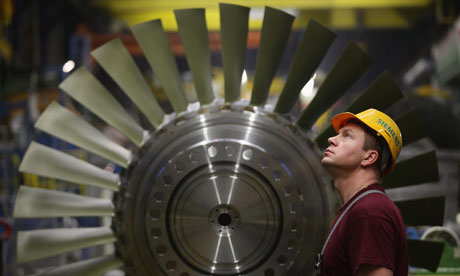
Manufacturers warn economy too weak for more austerity
2012-11-26 06:06:57
EEF warns the economy has shown no growth in the past year and investment remains 15% below its pre-recession peak
Britain's economy is not strong enough to cope with further austerity, the
manufacturers' trade body has warned, adding to the pressure on the chancellor
to reject bigger spending cuts in his autumn statement next month.
The EEF said George Osborne should focus on restoring growth by increasing
competition in the small business banking market and making purchases of new
plant and machinery fully tax deductible.
After a month of weak economic data that culminated last week in a higher than
expected public sector deficit, the EEF's call for a series of measures to
increase lending and investment will resonate with most business leaders.
Bank of England governor Mervyn King unnerved the business community recently
when he said Britain could suffer a triple dip recession after a brief recovery
in the third quarter of the year. King warned that the recovery will take long
and may include periods of contraction.
EEF chief executive, Terry Scuoler, said that despite a better third quarter,
the economy has shown no growth in the past year and business investment remains
15% below its pre-recession peak. "There's little that the government can do
about the world economy but there's a lot it can do at home," he said.
"In recent months, the government has been more vocal about the need for growth
and importance of speeding up delivery. The autumn statement now needs to match
these good intentions by providing some clarity on how this will happen.
"It should start by being clear on its ambitions for the economy in a way that
will drive action across Whitehall and send a clear signal to business about its
intentions. We have seen how the أ‚آ£1tn export target is stimulating action across
government but we now must see the same urgency and clarity of purpose on all
the issues that matter to growth."
His message was reinforced by figures from Lloyds Bank that showed consumers had
the same amount of money left over at the end of the month to spend on
discretionary items in October as they did a year earlier.
"Despite inflation receding throughout much of this year, consumers are yet to
see this fully translate by way of more pounds in their pockets once essential
spending has been accounted for."
Consumer sentiment improved slightly from September, according to the survey,
but remained subdued.
Osborne is understood to be considering a series of cost saving measures to
boost the government's finances, including ending tax relief for pension savers
who pay tax at the higher rate. He has also identified several areas for further
spending cuts, which he could unveil on 5 December.
He is under pressure after a two year period of zero growth that has depressed
tax receipts and pushed up welfare spending.
The Institute for Fiscal Studies said in a report that the deterioration in the
government's finances would lead to a أ‚آ£13bn shortfall and could force the
Treasury to extend spending cuts for a further year. The government has extended
its original five year programme by two years. The IFS said the poor performance
of the economy could force Osborne to extend the austerity programme, which
began in 2010 when the coalition came to power, to 2018 A series of spending
cuts are scheduled to hit the unemployed and disabled next year as a cap on
housing benefit and reductions in disability living allowance take effect.
Some Tory backbench MPs have called for further austerity measures to put the
public finances back on track, but the EEF said it would be folly to inflict
further pain on the economy when the result would be slower growth and lower tax
receipts.
Scuoler said: "Our economy is not strong enough to withstand any more austerity.
The government's first budget saw big cuts in capital investment spending and
they need to be reversed.
"Temporary tax cuts are also needed because even though there have been cuts in
corporation tax, the effective tax rate paid by businesses is still high. The UK
is still outside the top 10 OECD countries that provide the best tax environment
for business," he said.
Comments